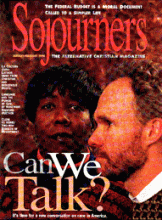The year is 1995. Much of America, especially white America, is debating about Powell's aborted presidential candidacy and whether the march's message and messenger are interminably linked. Many other people are honestly seeking hope in the midst of despair as they pursue new approaches to cross the great color divide.
Within this context I viewed the Minneapolis-based Guthrie Theater production of Theodore Ward's Big White Fog. The play was directed by Lou Bellamy, artistic director of St. Paul's African-American theater company, Penumbra. (I attended when a friend called to say she had tickets and the flu. I got the tickets; she kept the flu.)
The year is 1938. The Works Administration Project, a government-sponsored, anti-Depression program to ensure the development of the arts in lean times, invited Theodore Ward, a struggling young playwright, to draft a play. Ward believed that a play showing the "Negro condition" would be his best offering.
For more than 50 years, Ward's Big White Fog was not performed anywhere in this country. The play was both challenging and controversial. Its socialist tendencies, its large cast (as it was designed to put performers back to work during the Depression), and its portrayal of internecine black community issues (including skin tones, even before Spike Lee's School Daze) have made it a challenge for any theater to produce. But 1995 was a year to bring forward controversial debates within the African-American community.
The year is 1922. The Mason family is filled with strong personalities. Victor (Jonathan Earl Peck), the patriarch, is a disciple of Marcus Garvey, the charismatic Jamaican who formed the Universal Negro Improvement Association in 1914. Like Garvey, Victor believes that the best future for American blacks is to make the migration back to Africa, forming a new country of displaced Africans.
Victor's brother-in-law, Dan (Terry Bellamy), represents the segment
Read the Full Article
